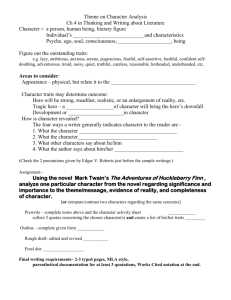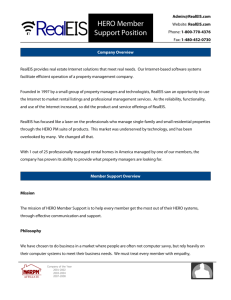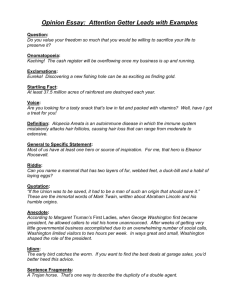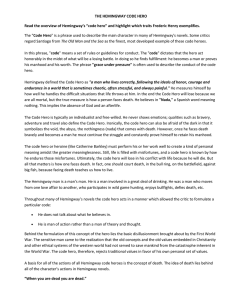12A - Henrico County Public Schools
advertisement
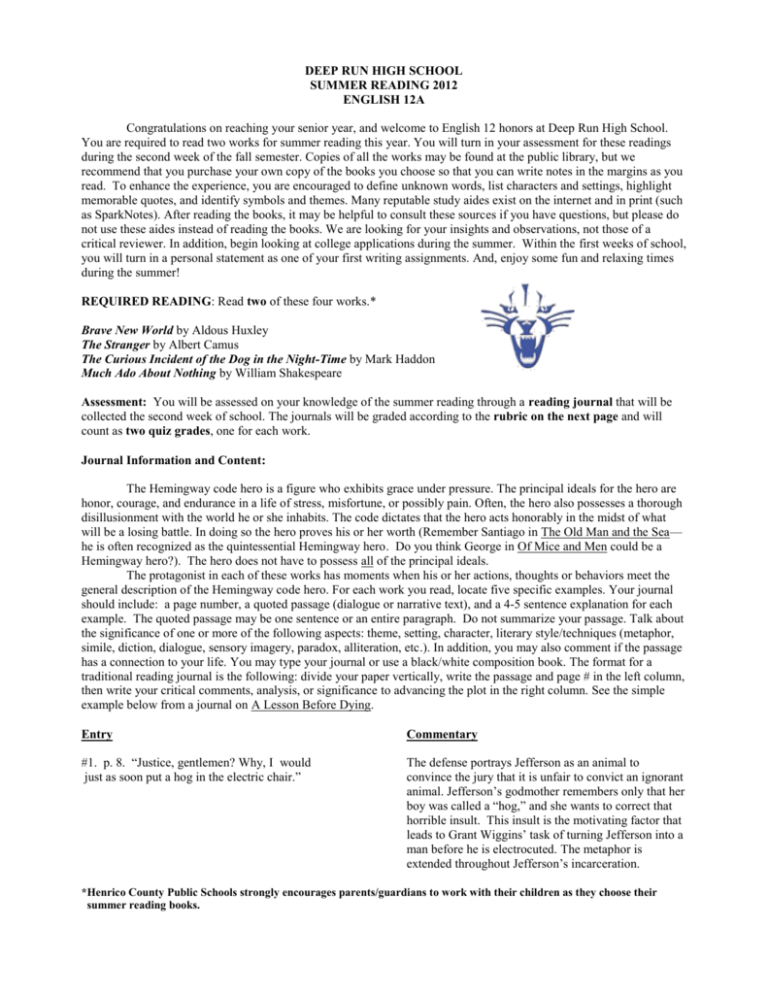
DEEP RUN HIGH SCHOOL SUMMER READING 2012 ENGLISH 12A Congratulations on reaching your senior year, and welcome to English 12 honors at Deep Run High School. You are required to read two works for summer reading this year. You will turn in your assessment for these readings during the second week of the fall semester. Copies of all the works may be found at the public library, but we recommend that you purchase your own copy of the books you choose so that you can write notes in the margins as you read. To enhance the experience, you are encouraged to define unknown words, list characters and settings, highlight memorable quotes, and identify symbols and themes. Many reputable study aides exist on the internet and in print (such as SparkNotes). After reading the books, it may be helpful to consult these sources if you have questions, but please do not use these aides instead of reading the books. We are looking for your insights and observations, not those of a critical reviewer. In addition, begin looking at college applications during the summer. Within the first weeks of school, you will turn in a personal statement as one of your first writing assignments. And, enjoy some fun and relaxing times during the summer! REQUIRED READING: Read two of these four works.* Brave New World by Aldous Huxley The Stranger by Albert Camus The Curious Incident of the Dog in the Night-Time by Mark Haddon Much Ado About Nothing by William Shakespeare Assessment: You will be assessed on your knowledge of the summer reading through a reading journal that will be collected the second week of school. The journals will be graded according to the rubric on the next page and will count as two quiz grades, one for each work. Journal Information and Content: The Hemingway code hero is a figure who exhibits grace under pressure. The principal ideals for the hero are honor, courage, and endurance in a life of stress, misfortune, or possibly pain. Often, the hero also possesses a thorough disillusionment with the world he or she inhabits. The code dictates that the hero acts honorably in the midst of what will be a losing battle. In doing so the hero proves his or her worth (Remember Santiago in The Old Man and the Sea— he is often recognized as the quintessential Hemingway hero. Do you think George in Of Mice and Men could be a Hemingway hero?). The hero does not have to possess all of the principal ideals. The protagonist in each of these works has moments when his or her actions, thoughts or behaviors meet the general description of the Hemingway code hero. For each work you read, locate five specific examples. Your journal should include: a page number, a quoted passage (dialogue or narrative text), and a 4-5 sentence explanation for each example. The quoted passage may be one sentence or an entire paragraph. Do not summarize your passage. Talk about the significance of one or more of the following aspects: theme, setting, character, literary style/techniques (metaphor, simile, diction, dialogue, sensory imagery, paradox, alliteration, etc.). In addition, you may also comment if the passage has a connection to your life. You may type your journal or use a black/white composition book. The format for a traditional reading journal is the following: divide your paper vertically, write the passage and page # in the left column, then write your critical comments, analysis, or significance to advancing the plot in the right column. See the simple example below from a journal on A Lesson Before Dying. Entry Commentary #1. p. 8. “Justice, gentlemen? Why, I would just as soon put a hog in the electric chair.” The defense portrays Jefferson as an animal to convince the jury that it is unfair to convict an ignorant animal. Jefferson’s godmother remembers only that her boy was called a “hog,” and she wants to correct that horrible insult. This insult is the motivating factor that leads to Grant Wiggins’ task of turning Jefferson into a man before he is electrocuted. The metaphor is extended throughout Jefferson’s incarceration. *Henrico County Public Schools strongly encourages parents/guardians to work with their children as they choose their summer reading books. Journal Rubric 1 = Weak. 2= Somewhat Weak. 3 = Average. 4 = Strong. 5 = Excellent 1. The topic of the journal entry meets the requirements of the assignment. 1 2 3 4 5 2. The journal entries cover 5 examples for each protagonist, which show the student's understanding of the characters. 1 2 3 4 5 3. The entries provide very descriptive explanation of protagonist as a Code Hero. 1 2 3 4 5 4. The organization of the journal entries are clear and easy to follow. 1 2 3 4 5 5. The journal entry flows smoothly from one idea to another. 1 2 3 4 5 6. The spelling, grammar, and punctuation in the journal is accurate. 1 2 3 4 5 7. The journal is neatly typed or handwritten. 1 2 3 4 5 8. The effort put forth has demonstrated the full potential of the student's capability. 1 2 3 4 5 Total Points: _________ If you have any questions over the summer regarding the assignment, please contact the following: Mrs. Coleman (dfcolema@henrico.k12.va.us) or Mr. Clarkson (tsclarkson@henrico.k12.va.us).


